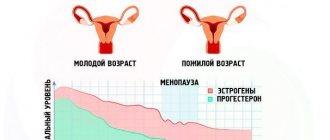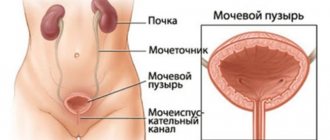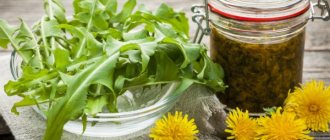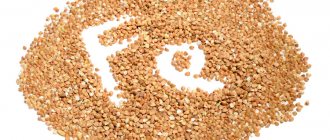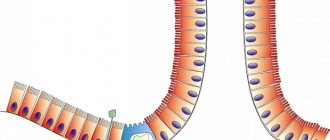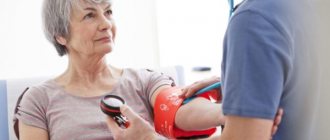Medicines based on herbal components help a woman survive menopause without causing inconvenient concomitant symptoms associated with ongoing hormonal changes. At the same time, products with a natural composition have a number of advantages and can be used both as an alternative and in conjunction with hormonal treatment. In this regard, it is important to know what role phytohormones play in menopause; drugs are a list of the most effective in the treatment of menopausal manifestations.
The concept of phytohormones
Climax translated from Greek means “step, ladder.”
Menopause is another life stage that all women go through without exception. Despite its natural course, menopause can be accompanied by unpleasant symptoms that make normal life activities difficult. Phytohormones will help cope with this condition. Since ancient times, people have noticed the healing properties of plants. Some plants contain substances similar in their action to those produced by the female body. The use of these plants can reduce the unfavorable symptoms that accompany the menopause. At the same time, the components of natural preparations are not perceived by the body as foreign.
Phytohormones act more gently on the body and are easily tolerated, but they are less effective compared to hormonal agents. In this regard, phytohormones are prescribed for moderate symptoms of menopause.
Phytohormones are divided into groups determined by the active components included in the composition.
Highlight:
- isoflavones;
- lagnans;
- kumestans.
Each group is characterized by certain properties and features of influence.
Non-hormonal drugs do not replace the lack of hormones that occurs during menopause, but promote their independent production by the body. Due to this, the imbalance that has arisen is leveled out and unfavorable symptoms are reduced.
What are estrogens?
Estrogens are three sex hormones that belong to the female type. Among them are extron, estradiol and estriol, which can be transformed under certain circumstances in the body. Estradiol in this trio is the most active.
Estrogen hormones are produced in women in the first half of the menstrual cycle. Moreover, they are of ovarian origin. After the first half of menstruation, some of the estrogens are synthesized in the adrenal glands. If the release of hormones coincides with pregnancy, they are synthesized in the placenta, starting in the second trimester. However, although the production of hormones for women is a natural function of the ovaries, there are situations when there is little activity or shutdown of this process. In this case, medications with estrogen are prescribed, which will help activate the functions of the ovaries.
Sources of phytohormones
Phytohormones are products of natural origin obtained from foods, plants, leaves of some trees, etc.
Since phytohormones are contained in some products, it is recommended to increase their consumption during menopause, which will also reduce the severity of adverse effects.
A large number of phytohormones are contained in legumes (soybeans, beans, peas, lentils), including which in the daily menu can significantly ease the course of menopause. Dates, rye, ginseng root, garlic, hops, grapes, pomegranates, sunflower seeds, chickpeas, rhubarb and other crops are also useful. After 40 years of age, women are recommended to increase the content of the listed products in their diet.
It should be remembered that eating food alone when symptoms of hormonal changes have already appeared will not improve the condition. In this case, it is necessary to additionally use medications (not necessarily hormonal drugs; phytohormones will also help).
Products containing phytohormones can be used to prevent the occurrence of adverse menopausal symptoms in advance of their onset.
Videos on the topic
https://youtu.be/K08eMYPcei4
The female hormone estrogen is necessary for the normal functioning of the genital organs. An insufficient amount of it leads to underdevelopment of the reproductive system and, as a consequence, problems associated with conceiving and bearing a child. After taking the test and confirming the pathology, the natural question arises of how to raise the hormone level to normal. Modern medicine offers many drugs that successfully combat this deficiency. In addition, it is possible to increase estrogen using folk remedies.
p, blockquote 1,0,0,0,0 —>
p, blockquote 2,0,0,0,0 —>
p, blockquote 3,0,0,0,0 —>
p, blockquote 4,0,0,0,0 —>
The importance of phytohormones during menopause
Phytohormones have a positive effect on a woman’s body.
They have the following properties:
- affect vegetative-vascular symptoms (reduce the severity and frequency of hot flashes, increased sweating);
- affect the psycho-emotional background (mood lability, increased irritability, anxiety, sleep disturbances);
- have a beneficial effect on the cardiovascular system (stabilize blood pressure and heart rate).
In addition to the listed properties, phytohormones help strengthen the body’s defenses, reduce discomfort and vaginal dryness, slow down the aging process, and prevent the occurrence of various diseases.
Correct selection and use of phytohormones will allow you to avoid diseases such as osteoporosis, vascular atherosclerosis, metabolic disorders, and heart disease, which often develop during menopause.
General recommendations
There are general recommendations for all groups of hormonal pills:
- All medications are prescribed exclusively by a knowledgeable specialist;
- Before starting a course of treatment, you need to study the instructions;
- To achieve a high therapeutic effect, all dosages and treatment regimens should be followed.
In some situations, an adverse reaction from estrogen tablets may occur. By changing the dose or treatment regimen, you can eliminate or reduce side effects.
According to reviews from women who use estrogen pills, the following reactions most often occur:
- Bloating;
- Nausea;
- Headache;
- Soreness of the mammary glands;
- Frequent mood changes;
- Intermenstrual bleeding.
General indications for the use of herbal medicines
Herbal medicines, despite their natural composition and safety, should be prescribed by a specialist after assessing the results of examinations and in accordance with the available indications.
They are prescribed for:
- Early onset of menopause (before 45 years of age).
- Irregular menstrual cycle.
- Diseases that prevent the prescription of hormonal therapy (diabetes mellitus, circulatory disorders, heart pathologies, kidney disease, high blood pressure).
Herbal medicines are also used after removal of the ovaries, chemotherapy, both together with hormonal drugs and in isolation.
They are the means of choice for the development of osteoporosis, diseases of the genitourinary system, in particular urinary incontinence. It is not recommended to use herbal remedies for persons intolerant to dairy products. People with alcohol dependence should use drugs in the form of tinctures with caution.
Preparations based on phytohormones should only be prescribed by a specialist. Self-medication can lead to worsening of the condition and the development of complications.
The role of estrogen in the body
Female sex hormones ensure reproductive function. They are always present in the body, but their ratio and quantity may change at different periods of a person’s life. The highest levels of the main female sex hormones - estrogens - are found in women of reproductive age. In the first phase of the menstrual cycle, when the body prepares for conception, eggs are formed and the uterine lining thickens. It is during this phase that estrogens work.
Female sex hormones perform the following functions:
- ensure the release of a mature egg and the possibility of its fertilization after ovulation;
- regulate the menstrual cycle;
- promote the development of mammary glands;
- participate in the distribution of subcutaneous fat, characteristic of the female body type;
- cause libido.
Estrogens are otherwise called hormones of female attractiveness. They make the representative of the fair half of humanity feminine and signal that she is ready to conceive and bear a child.
The most effective herbal remedies for menopause
Due to their beneficial properties, sufficient effectiveness and safety, herbal medicines are widely used in medical practice.
The most commonly used herbal remedies for menopause include:
- Klimadinon. The main active ingredient of the drug is black cohosh extract. Helps reduce the manifestations and frequency of hot flashes, reduces the severity of psycho-emotional disorders, and normalizes sleep.
- Feminal. Contains red clover extract. Effectively fights the symptoms of hot flashes, improves the condition of nails and skin.
- Remens. Consists of snake venom, glands of cuttlefish, polycarpus, cohosh, sanguinaria. Reduces the intensity of headaches, normalizes the functioning of the heart and blood vessels. Prevents excess weight gain.
The following drugs are also quite effective:
- Estrovel. Contains a collection of medicinal herbs, vitamins and natural honey. Helps with hot flashes, reduces the manifestations of psycho-emotional disorders, helps strengthen the immune system and prevents the development of increased bone fragility.
- Qi-Clim. Used to reduce the frequency of hot flashes.
- Inoclim. The drug is based on soybean extract. Helps normalize sleep, has a beneficial effect on the heart and blood vessels, reduces the frequency and severity of hot flashes, and fights disorders in the psycho-emotional sphere.
This is not the entire list of drugs based on herbal components that are effectively used in the treatment of menopausal symptoms. If there are signs of osteoporosis, the following are mainly prescribed: Menopace, Ledis formula Menopause. Such drugs as Lefem, Femivel, Klimaksan, Klimalanin are also known.
Plant components are also used in the production of creams. Their combined use with herbal remedies can significantly slow down the aging process and improve skin condition.
Despite the wide choice of drugs, they must be selected taking into account the individual characteristics of the body and existing symptoms. A product that is good for one woman may not be suitable for another.
Causes of increased estrogen levels
A sudden increase in sex hormones responsible for reproductive function in a woman’s body occurs in the following cases:
- During menopause. Typically, with the onset of menopause, the amount of estrogen in the body decreases. At the same time, excess weight gain occurs due to the cessation of ovarian function. As a result of an increase in the subcutaneous fat layer, the process of estrogen growth begins.
- During pregnancy.
- For endometriosis, polycystic ovary syndrome and other diseases accompanied by menstrual irregularities.
- For obesity caused by poor nutrition with a predominance of foods containing fats and genetically modified organisms.
- For chronic sleep deprivation (sleep less than 7 hours a day).
- In constant contact with household chemicals (vapors from cleaning products, glue, plastics, sprays and deodorants).
- For liver diseases.
- When under stress.
Before figuring out how to lower your estrogen levels, you need to determine the cause of the increase. Only in this case will the treatment be effective.
What plants improve the condition of women during menopause?
To relieve the adverse symptoms that accompany menopause, you can use decoctions based on herbs and herbal infusions. You can easily prepare such a product at home: for this, according to the instructions, a certain amount of raw material is poured with hot water and left to brew for a while. The prepared decoction can be drunk as tea or added to the bath.
Plants that have beneficial properties in the fight against menopausal symptoms include:
- red brush - most effective for normalizing hormonal levels, has pronounced immunostimulating and rejuvenating properties;
- sage – helps with frequent hot flashes, increased sweating, normalizes blood pressure, has a general strengthening and anti-inflammatory effect;
- oregano – stimulates the ovaries, is effective for hot flashes, helps normalize sleep, prevents dysfunctional uterine bleeding caused by a lack of estrogen.
Also used in the fight against the symptoms of menopause are: red clover, black cohosh, rosemary, hawthorn, calamus, hogweed, flax, rowan. Mint, hops, valerian, motherwort have a beneficial effect on the nervous system, have a calming effect, and normalize sleep.
Soy, which is actively used in the fight against menopausal symptoms, reduces the frequency and severity of hot flashes, increases performance, and helps with psycho-emotional disorders. Soy also protects brain cells and prevents the development of tumor processes.
Quite popular cohosh, used in many herbal remedies, normalizes sleep, eliminates hot flashes, reduces anxiety, normalizes metabolic processes, stabilizes blood pressure, promotes restoration of mucous membranes, and prevents the aging process. Cohosh relieves joint pain and prevents the development of increased bone fragility.
Before using herbs and herbal preparations, you should consult a specialist to select the correct doses and duration of treatment.
Symptoms of increased estrogen in women
Hormonal imbalance necessarily leads to disruptions in the menstrual cycle. This is the first signal to check the ratio between estrogen and progesterone in the body.
Symptoms of increased levels of female sex hormones in the body:
- regular headaches;
- uterine bleeding;
- acne on the face;
- high blood pressure;
- weight gain;
- dryness and sagging skin;
- hair loss;
- night cramps in the calf muscles and foot;
- frequent fractures.
Once you have identified the symptoms of hormonal imbalance, you need to take all necessary measures on how to reduce your estrogen levels. If you ignore the symptoms, the consequences can be dire: from the growth of benign tumors in the uterus and ovaries (fibroids, cysts) to cancer.
Advantages and disadvantages of non-hormonal therapy
Hormone replacement therapy effectively helps relieve the adverse symptoms of menopause. However, this type of treatment is used only for severe symptoms of menopause. In some cases, the use of hormonal therapy is difficult due to existing contraindications and the occurrence of adverse reactions.
During the initial manifestations of menopause and when they are not very pronounced, doctors recommend using non-hormonal products based on herbal ingredients. Preparations containing phytoestrogens are safe, easily tolerated by patients, do not cause adverse reactions, and have virtually no contraindications.
Herbal medicines have the following advantages:
- Suitable for most women.
- Compatible with other drugs.
- Strengthens the body's defense mechanisms.
Non-hormonal drugs also effectively prevent the possible development of diseases such as osteoporosis, cardiovascular pathology, atherosclerosis, and disorders in the genitourinary system. Herbal medicines are suitable for correction and weight loss.
The main disadvantage of non-hormonal drugs is their cumulative effect. In order to achieve the expected result, the drug must be used for some time. In case of individual intolerance to some components of the drugs, allergic reactions may occur.
If there is no effect in the first days of taking the herbal medicine, you cannot increase the dosage of the drug. The drug has an accumulating effect, so the reaction is observed after some time of its use.
Principles of action of antiestrogens and antigestagens[edit | edit code]
A. Selective estrogen receptor modulators (SERMs)
Source:
Visual Pharmacology
.
Author
: X. Lulman.
Per. with him. Ed.
: M.: Mir, 2008
Selective estrogen receptor modulators (SERMs) (A). Estrogen receptors belong to the group of receptors that regulate transcription. The female sex hormone estradiol is an agonist of these receptors. Substances in this group can act as antagonists, although in many tissues they behave as agonists. This behavior is explained by the fact that in order to attach to the estrogen receptor, the ligand must take on a specific conformation. Complexes of the ligand and the estrogen receptor that bind to certain regions of the genome act as coactivators or corepressors. The structure of coregulators in different tissues is different, so the effects of various drugs of the SERM group are organ specific. From a medical point of view, it is important that estrogenic and antiestrogenic drugs from this group of drugs differ in specificity.
B. Progestogen receptor antagonists
It makes sense to characterize this group of drugs and pay attention to their activity during the postmenopausal period. Chronic use of estradiol increases the risk of developing endometrial cancer. If gestagens are additionally prescribed, the risk of the disease is reduced. More cases of breast cancer are being detected, which, however, may be due to increased medical supervision. Estradiol increases the risk of thromboembolism. It facilitates menopause by reducing hot flashes and sweating, and with long-term use it reduces the risk of developing osteoporosis, as it prevents the loss of estrogen-dependent components of bone tissue. However, the use of estrogens for this purpose is still not recommended due to the unfavorable relationship between action and possible risk.
Clomiphene
- a stilbene derivative - used to treat infertility in women. Due to the antagonistic effect on estrogen receptors of the anterior pituitary gland, the negative feedback from the action of estradiol is disrupted, and gonadotropin production increases. An increase in FSH levels leads to accelerated follicle maturation. Clomiphene is prescribed for insufficiency of corpus luteum function due to impaired follicle maturation, as well as for polycystic ovary syndrome. The drug is taken only on certain days of the cycle; it does not have a permanent effect.
Tamoxifen
- a stilbene derivative - used for metastatic breast tumors to block estrogenic stimuli for proliferation. The drug facilitates menopause due to its antiestrogenic effect. Along with this, it has an agonistic effect, which should be taken into account as a risk factor.
Raloxifene
used for the prevention of osteoporosis during the postmenopausal period. For the advantages and disadvantages of the drug, see the table.
Progestogen receptor antagonists
. A week after fertilization, the embryo (in the form of a blastocyte) implants into the endometrium. The embryo produces choriogonadotropin (hCG), which acts similarly to LH and promotes the preservation of the corpus luteum, progesterone production and prevents the occurrence of menstruation. Mifepristone, as an antagonist of gestagen receptors, prevents the preservation of the uterine mucosa in the early stages of pregnancy, i.e., it acts as an abortifacient. The possibility of its use is widely debated (in terms of comparing the side effects of the drug and surgery), and the ethical side of its use is also discussed. It has been withdrawn from sale in Germany.
Choice of drugs
Preparations containing natural ingredients are classified as biologically active food additives, so they are sold in pharmacies without a doctor’s prescription. But as mentioned earlier, the selection of a drug should be carried out only by a specialist, based on the results of examinations, existing symptoms, individual characteristics and the condition of the body. At the same time, during the period of use of herbal medicines, it is recommended to undergo preventive examinations at least twice a year, and, if necessary, undergo additional examinations.
If any unpleasant symptoms appear while using medications containing phytoestrogens, you should immediately seek medical help. Such symptoms can often occur when dosages and recommendations for use of the products are not followed.
Herbal medicines differ in their mechanism of action, so the choice of drug is based on the prevailing symptoms. For example, Klimaksan and Klimalanin cope most effectively with hot flashes; you can notice the result from the first dose. In contrast, Remens does not cope well with hot flashes, but is good at eliminating irritability.
Due to poor tolerability and many contraindications to hormonal therapy, medications containing phytoestrogens are increasingly and preferably used. Herbal medicines have a natural composition, are easily tolerated, have virtually no contraindications, and do not cause adverse reactions.
The pharmaceutical market offers a wide selection of non-hormonal drugs. However, despite the safe composition, this group of drugs is prescribed only by a specialist. Self-medication may worsen the condition.
Side effects and overdose
While taking medications containing synthetic estrogens, a woman may encounter a list of the following side symptoms:
- headache and dizziness;
- irritability;
- chloasma;
- digestive disorders;
- depressive states;
- arterial hypertension;
- spotting during the intermenstrual period;
- dryness of the vaginal mucosa;
- cramps in the lower extremities;
- nausea and vomiting;
- decreased libido.
Similar conditions can occur if the dosage regimen of estrogen drugs is violated.
